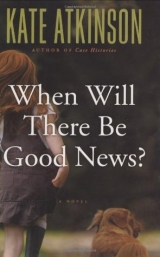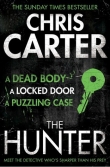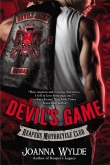
Текст книги "When Will There Be Good News?"
Автор книги: Kate Atkinson
Соавторы: Kate Atkinson,Kate Atkinson
Жанры:
Триллеры
,сообщить о нарушении
Текущая страница: 7 (всего у книги 22 страниц)
*
Reggie received a postcard a week into the fortnight so her mother must have written it not long after she'd arrived. It was a photograph of the hotel, a white concrete building that looked as if it had been constructed out of badly stacked blocks, the rooms all at odd angles to each other. At the rectangular heart ofit was the swimming pool, turquoise and empty, bordered by neatly arranged white plastic recliners. There were no people at all in the photograph so it was probably taken very early in the morning, everything as yet unsullied by wet towels and sun cream and half-eaten plates of chips.
On the back, Mum had written, 'Dear Reggie, Hotel very nice and clean, food plentiful, our waiter is called Manuel, like in that John Cleese thingy! Drinking a lot of sangria. Naughty, naughty! Already made friends with a couple called Carl and Sue from Warrington who are a good laugh. Missing you loads. Back soon, love, Mum xxx' Gary had added his name at the bottom in the big round hand ofsomeone still not convinced by the concept ofjoinedup writing. Sangria came from the same Latin root as 'blood'. Blood-red wine. There was a poem they had done in school about a Scottish king drinking blood-red wine but Reggie couldn't remember more than that. She wondered if eventually she would forget everything she'd learned. That was death, she supposed. Reggie wondered if her life would get back on track before she died. It seemed unlikely, every day it felt as if she was being left further behind.
Reggie was working on her own translation for Ms MacDonald ofBook Six of the Iliad, one of her Greek set texts. She thought she might sneak a peek at the relevant Loeb to check what she had so far (,Nestor then called to the Argives, shouting aloud, "Brave friends and Greeks, servants of Ares, let no one now stay behind." '). She wasn't supposed to refer to the Loebs, of course, that was cheating, according to Ms MacDonald. 'Helping,' Reggie would have said.
Volume One of the Iliad had definitely been there last week but when she came to look for it now there was no sign of it. She noticed other gap-tooths in the bookshelf -the first and second volumes of the Odyssey and the second volume of the Iliad, the first of the Aeneid (one of her Latin set texts). Ms MacDonald had probably hidden them. She carried on laboriously, ' "Let us kill men. Afterwards at your leisure you shall strip the bodies of the dead.'" There were an awful lot of the dead in Homer.
After her mother died Reggie always kept the postcard from Spain close, in her bag or at her bedside. She had studied every detail ofit as if it might contain a secret, a hidden clue. Her mother had died right there in the empty space of turquoise water, and, although Reggie had seen her in the undertaker's after she was shipped home, a tiny part of her believed that her mother was still inhabiting that bright postcard world and ifshe scrutinized the picture long enough she might catch a glimpse of her.
Mum had woken up before any other guests were about, she was always an early riser, and, leaving Gary snoring off the previous night's sangria, she had put on her unsuitable swimming costume beneath her pink towelling dressing gown and made her way down to the pool. The pink towelling dressing gown had been dropped where she stood poised at the edge of the deep end. Mum was never one for neatly folding clothes. Reggie imagined her raising her arms above her head -she was a good swimmer and a surprisingly graceful diver -and then plunging into the cool blue ofoblivion, her hair streaming after her like a mermaid. U11e, Mater.
Afterwards, at the inquest in Spain that neither Billy nor Reggie attended, the police reported that they had found her cheap silver Valentine's locket at the bottom of the pool (,Bit of a dodgy clasp,' Gary admitted guiltily to Reggie) and speculated that it had come offwhile she was swimming and that she had dived down to retrieve it. No one could know for sure, no one was there to witness what happened. If only it had been the morning that the postcard photographer was taking his shots of the hotel. Perched high in his eyrie, possibly on the roof of the hotel, he would have watched Mum slicing down through the blue water, contemplated putting her into a photograph -prohably decided against it given the orange lycra and the pale plumpness of Mum's northern skin -and then alerted someone (,Holaf') when she didn't come back again. But that wasn't how it happened. By the time someone noticed that her beautiful long hair was trapped in a drain down in the turquoise depths it was too late.
It was a waiter who spotted her, setting up tables for breakfast. Reggie wondered if it was the 'Manuel' of the postcard. He had dived in, in his waiter's uniform, tried and failed to pull the English mermaid free. Then he had climbed out of the pool and run to the kitchens where he grabbed the nearest knife, dashed back to the pool, dived into the water again and sawed through Mum's hair to finally liberate her from her underwater prison. He attempted to revive her -at the inquest he was commended for his attempts to save the poor unfortunate tourist -but of course to no avail. She was gone. No one was to blame, it had been a tragic accident. Etcetera.
'Which it was, after all, Reg,' Gary said. He had attended the inquest and came to see Reggie on his return from Spain, appearing unannounced on the doorstep, a six-pack of Carlsbergs in his hand, 'to toast a wonderful woman'. He had slept through everything. By the time he was woken, bleary and hungover, by 'Carl and Sue from Warrington' hammering on his door, it was all over. He was, he said to Reggie, 'all choked up' about what had happened.
'Yeah,' Reggie said. 'Me too.'
The Spanish police returned the heart-shaped locket to Gary who kept it 'as a souvenir'. No mention was made at the inquest of what had happened to the thick lock of Mum's hair left down in the pool. Or indeed the knife that had cut through it. Did it go in the dishwasher, was it back chopping vegetables for a paella by the time the day was out? Reggie would have liked to have Mum's hair as a memento. She would have slept with it beneath her pillow. She would have held on to it the way the baby held on to Dr Hunter's hair, like he held on to his green blanket. It would have been Reggie's talisman.
'Aye, it just goes to show,' Gary said, turning philosophical after the third Carlsberg. 'You never know what's waiting around the corner.' Reggie sat out this visit of condolence, the nearest thing her mother would have to a wake. She had been to a wake, with Mum, a proper Irish one held by their neighbours, the Caldwells, a couple of years ago when old man Caldwell had died. It had been a cheerful affair with a lot of singing, some of it very bad, and endless bottles of Bushmills produced by the many and various mourners so that Mum had to be carried home by a big Caldwell boy who told everyone next day how Mum had tried to get him to climb into bed with her before throwing up all over him. Still, as Mum said later, it had been a good send-off for the old man.
Gary left after the fourth Carlsberg and Reggie didn't see him again until a few weeks later when she ran into him in the supermarket, where he was browsing the tinned soup aisle in the company of a woman with too much henna in her hair. Reggie waited to see if he would recognize her but he didn't even notice her, his brain already stretched to breaking point from making the choice between Heinz Big Soup BeefBroth and Batchelor's Cream ofTomato. It was the same supermarket Mum used to work in and it seemed disrespectful to be in it with another woman. Almost like infidelity.
The postcard had arrived through the letterbox at virtually the exact moment (taking into account the time difference between Britain and Spain) that Mum was leaving the planet. Reggie thought about Laika the poor spacedog rocketing into the sky and looking down on earth with eyes as dead as stars. Reggie had thought she might still be up there but no, Dr Hunter said, she fell back to earth after a few months and burned up in the atmosphere. Lassie, come home.
Usually, round about this time of the evening Banjo would sit by the back door and start to whine and Reggie would say to him, 'Come on then, poor wee scone, time for your constitutional,' and Banjo would waddle unsteadily along the street to his favourite gatepost where he would awkwardly lift an arthritic leg. He could just about make it to the gatepost but usually had to be carried back. Reggie was always surprised when she lifted him up in her arms how little he weighed compared to the baby.
Ms MacDonald lived in a housing estate that almost backed on to the East Coast main line. The whole house shook every time an express train hurtled past. Ms MacDonald was so used to trains that she didn't even hear the regular earthquakes they caused, at least not if the trains were running to timetable. Occasionally, over tea, Ms MacDonald would suddenly cock an ear, in much the same way that Banjo used to before he lost his hearing, and say something like, 'That can't be the six-twenty Aberdeen to King's Cross, can it?'
Reggie, on the other hand, heard every train. They gave her an odd feeling in the pit of her stomach when she heard them approaching, something fearful and primitive (atavistic!) and she wondered if her Stone Age brain thought the train was a woolly mammoth or a sabre-toothed tiger or whatever other creatures sent her ancestors running to the back of the cave because Dr Hunter said that 'after all' we still had the DNA of Palaeolithic hunter-gatherers and as far as she could see we hadn't evolved biologically and emotionally and we were all still Stone Age people with 'a thin veneer of culture and sophistication on top. Strip that off and we're back to basics, Reggie -love, hate, food, survival. Although not necessarily in that order.' It was certainly a theory that helped to explain Billy.
Tonight Banjo was lethargic and showed no interest in going out, lying instead in front of the heat of the gas fire. Reggie was grateful, it was a horrible night, gusts of wind repeatedly lifting and dropping the brass knocker on Ms MacDonald's front door so that it sounded as if an unseen visitor was desperate to get in. Cathy come home to Wuthering Heights. Mum's ghost looking for Reggie. Back soon. Je reviens. Or just nobody and nothing.
Fast falls the eventide; the darkness deepens.
Rapture Ready EVERYONE WAS FASTIDIOUSLY IGNORING THE DRUNK GUY WHO WAS lying completely immobile on the floor and Jackson felt a twinge of guilt. He had once arrested someone for being drunk and disorderly and it turned out the man was suffering from a bleed in the brain as a result ofa concussion and had nearly died right there in the holding cell. Bearing this in mind, he knelt down to inspect the prostrate form on the carriage floor.
His position gave him a close-up view of the feet of the woman in red, clad in a pair of ferocious spiked heels, shoes that were half-fetish, half-weapon. A banshee of a woman had once attacked him with the heel of her shoe when he'd been trying to wrangle a hen night that had got out of hand, giving a whole new meaning to the words 'killer heels'. The mother of the bride, he seemed to remember, had been the owner of the shoe. He was trying to recall what Cambridge pub that had been in at the same time as checking the drunk guy's vital signs (who said men couldn't multi-task) when the train suffered another jolt, and then a rapid series ofjolts, each one worse than the one before. The train started to speed up, which really didn't seem like a good thing in the circumstances. There was a smell ofburning -rubber and something unpleasantly chemical -accompanied by a high-pitched shrieking noise as ifmetal was grating on metal. Jackson could actually feel the train swaying as ifit was trying to keep its balance.
Christ, here we go, he thought. Not bound for London, not bound for glory, this train was bound for hell.
People screamed, the woman in red included. Jackson tried to reach out and reassure her (or at least get her to stop screaming) but the carriage started to tip to one side and she slipped out ofhis sight.
Jackson hoped there were angels in the cab with the driver, he hoped the driver could hardly breathe for the amount of wing feathers in the air and that he had Gabriel himself as his wingman. It went without saying that Jackson didn't believe in angels but in extremis he was always willing to give credence to anything. Indeed, he hoped that well-known hobo, the Angel of the North, had caught a ride at Gateshead and was even now directing his rusty flock in how to ride the rails.
The song 'Jesus Take The Wheel' came into his head and he thought he might not go quite that far but he wouldn't mind if the Virgin Mary took her foot off the dead man's handle and slowed them up a bit.
The carriage suddenly righted itself andJackson had just begun to think that they might be OK when it just as suddenly canted over again, only this time it flipped through ninety degrees on to its side. The train terminates at TVczverley the old woman had said, but she was wrong after all. It terminated here.
You can't fight a train crash. People and luggage were thrown around indiscriminately in a grotesque jumble, lit only by the sparks from metal on metal and the occasional unpleasant light intermittently shed by something electrical that was shorting overhead. Instinctively, Jackson tried to protect the drunk guy by throwing himself on top ofhim. If he'd had time for a considered decision this wasn't the person he would have chosen to save (babies, children, women, animals, in that order, was his preferred roster). It made no difference anyway because he was discovering that a derailing train didn't give you much choice about where you went and what you did. And trying to hang on to something was futile when everything was in cataclysmic, chaotic freefall. The noise was territying, unlike anything he'd experienced before (even war), and there seemed to be no end to it as the train, or at any rate the carriage they were in, kept on travelling on its side. He supposed time had expanded as it did in all accidents but how long could it carryon for? What if it went on for ever? What ifthis was hell? Was he dead? Did everything hurt this much when you were dead?
Finally it came to a stop. They were in pitch darkness and for a second, as if time was suspended, absolutely no sound. For an eerie moment Jackson wondered if everyone else was dead. Then people started to cry out, groaning and screaming. Perhaps this was hell? Darkness, the smell of burning, children crying for their mothers, mothers crying for their children, general lamenting and weeping. In Jackson's book you didn't get much closer to hell than that.
Someone close by whimpered like a dog in pain. A woman, it sounded like the woman in red, kept saying the word 'No' over and over again. A mobile phone rang, the ringtone incongruously the theme from The High Chaparral. A man's voice murmured, 'Help me, please someone help me.' Jackson, the sheepdog, always had a Pavlovian response to a plea for help but he couldn't work out which direction the words had come from -there was no up or down, no backwards or forwards any more. He could feel something warm and wet that he thought might be blood but he had no idea ifit was his own or someone else's. He was surrounded by dark shapes and objects that might have been bags or bodies, it was impossible to tell. He could feel broken glass everywhere around him and when he gingerly made a move he heard a soft cry of pain. 'Sorry,' Jackson murmured.
He tried to work out the orientation of the carriage. He was pretty sure they hadn't rolled completely over so there should be windows where the roof had been. The smell of burning was growing stronger all the time, there was no emergency lighting but there was a dull glow in the distance that didn't augur well and there was the foul smell of an electrical fire. The train needed evacuating in double-quick time.
He decided to manoeuvre over to where he thought the roof was (a trail of' Sorry's), thinking it might be easier to get some purchase there if he was going to climb up towards the window.
'Help me,' the voice said again and Jackson realized it was coming from beneath him, from someone he was actually crawling over. Jesus. Climb over seats, climb over people, forget anything your mother ever taught you about manners but it didn't work like that, not in reality. (In the other time dimension that he was occupying, where life was continuing as normal and he wasn't expecting to die at any moment, he wanted to sit down and write a note to posterity, to Marlee, that said, You'll want to stop and help other people. Don't!)
Jackson shifted his weight as much as he could. 'All right, mate,' he said, one injured soldier to another, 'we'll get you out of here.' Leave no man behind. He explored warily, got his arms around the guy's chest as if he was saving him from drowning, pulling him to shore. Heaving and dragging him over to where he thought the roof was. If he'd been thinking logically he might have considered the risk of spinal injury from hauling someone like a sack of coals, but there was no logic in this mayhem. One at a time, he thought. I'll get them out one at a time.
And then suddenly, with no warning, the two of them were falling through nothingness. Jackson clung on to the man as they performed their odd waltz into the abyss, Butch and Sundance going over the cliff. A bit ofJackson's brain was going What the fuck? while another bit was wondering where they were going to land. There was another more paranoid part of his brain that was worrying that they were never going to land at all. Why this is hell, nor am lout ofit. (And he slagged offJulia for quoting at inappropriate times.)
Then it was over. They landed with a sickening thud, parachutists without a parachute, and rolled down a steep incline before coming finally to a stop. He banged his head hard when they landed, he felt sick with the pain of it. He lay on his back for a second trying to breathe, sometimes breathing was all you could manage. Sometimes breathing was enough. He remembered lying on the road after his showdown with the sheep this afternoon (really only this afternoon?) looking at the pale sky. There were days that really surprised you with the way they turned out.
The rain falling on his face revived him a little and he managed to struggle to a sitting position. He was shivering with cold, with the onset of shock. There were lights somewhere and he realized that they weren't in the middle of nowhere after all, there were houses, strung out along the track, and now there were voices as the first people arrived at the scene, civilians not professionals, he could hear their confusion as they encountered a whole new definition for nightmare.
Jackson understood what had happened now. He had been trying to find the roof of the carriage but there had been no roof to find it had peeled back like the top of a sardine can and Jackson and his accidental new companion had plunged straight out of the train and down an embankment and now they were lying in a kind of gully. The man he had fallen with (Help me) lay without moving, face down in the mud a few feet away. Jackson dragged himself over to him. He didn't have the strength to roll him over, he seemed to have hurt his arm when he fell, and the best he could do was to turn the man's head to the side to stop him suffocating in the mud. He thought of his grandfather's brother, going over the top at the Somme, drowning in the mud at Passchendaele.
A light appeared at the top of the embankment, a torch, providing enough faint light for Jackson to see his companion's face. For some reason he had presumed it was either the young drunk guy or the tired suit and he was surprised to see that it was one of the squaddies. He looked pretty much dead. Survive a war where death stalks you at every moment and then find yourself picked off on the East Coast main line.
Jackson had thought the torch signalled rescue but the light disappeared as quickly as it had appeared and Jackson shouted 'Hey,' his voice coming out as a reedy croak. He started trying to clamber up the embankment. He had to get more people out of the train. People who were still alive preferably. He got about halfway up and had to stop, suddenly as weak as a kitten. There was something wrong, he'd been injured in some way but he wasn't sure how. It dawned on him, unexpectedly, that it was bad. Combat injury. He needed medevacking out of the field. He slipped back down the embankment.








